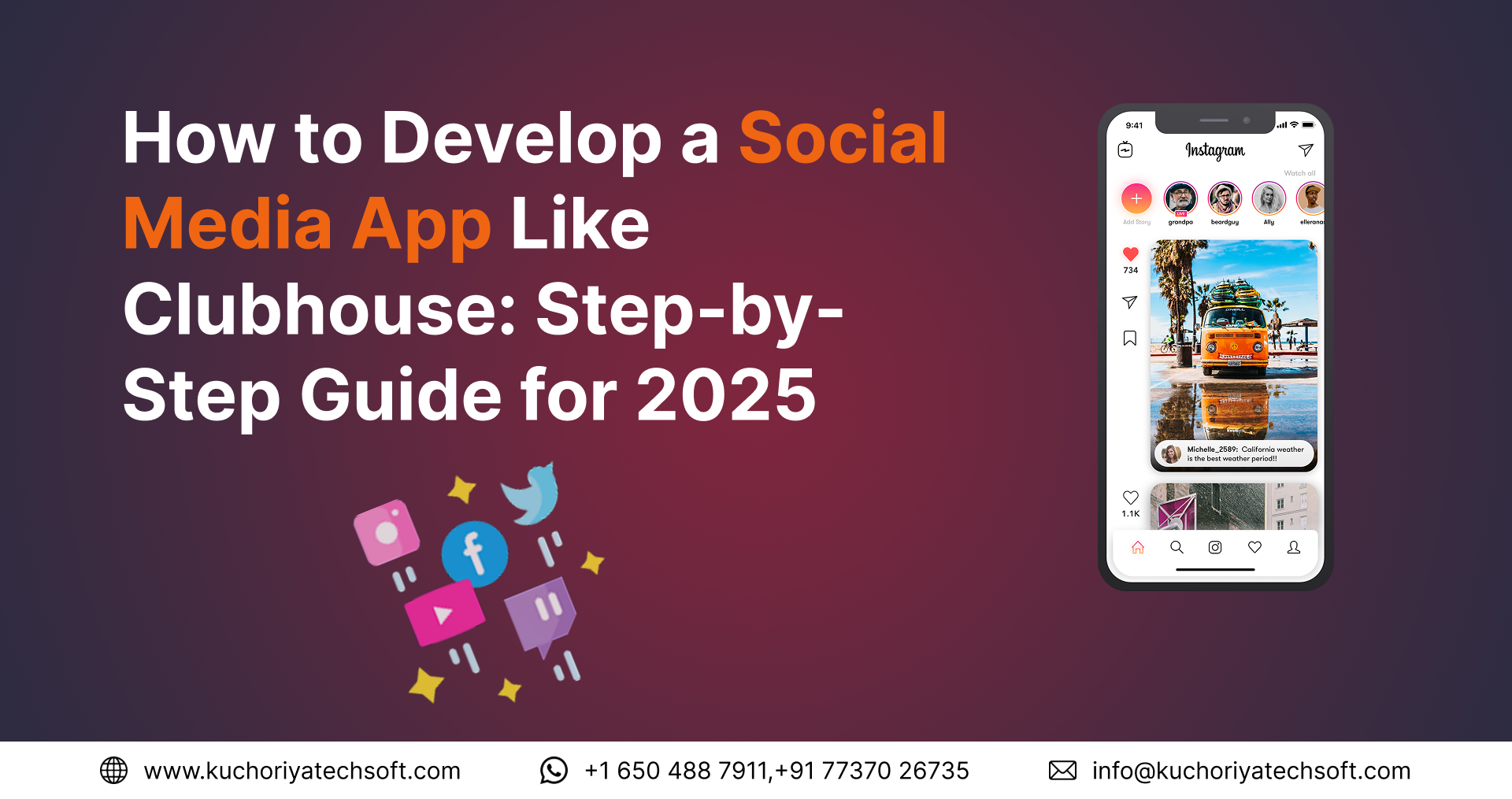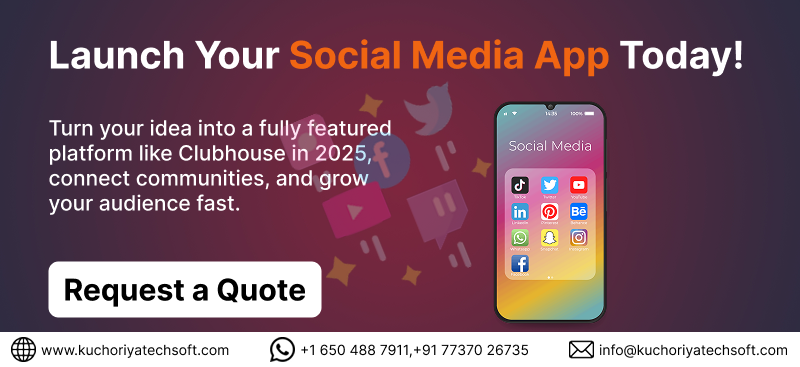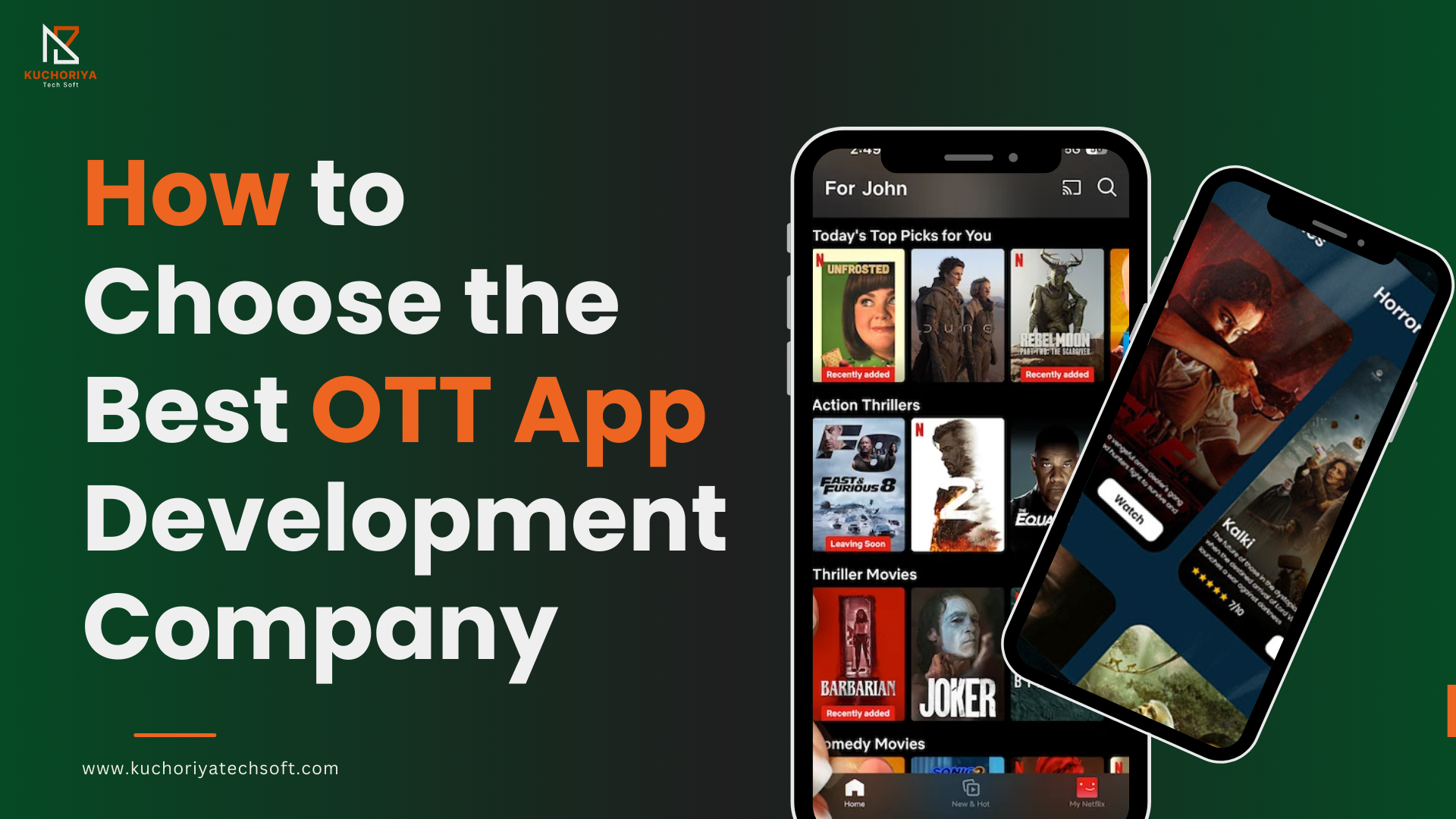How to Develop a Social Media App Like Clubhouse: Step-by-Step Guide for 2025
Over the last few years, social media apps have revolutionized how people connect, share, and build communities. Among them, Clubhouse proved that audio-first interaction is more than a trend — it’s a billion-dollar opportunity. According to Statista, the global social networking market is expected to reach $310 billion by 2025, with audio-based platforms such as Clubhouse, Twitter Spaces, and Spotify Live driving new growth. Searches for terms like “how to make a social media app” and “social media app development” show that businesses worldwide are racing to capture this momentum.
But building a social media app like Clubhouse isn’t just about features — it’s about making the right technology, strategy, and scaling decisions from day one. That’s where our company helps. Through Virtual CTO services — including Fractional CTO, Remote CTO, and CTO-as-a-Service solutions - we guide startups and enterprises in:
- Choosing the best technology stack for social media app development
- Defining a scalable architecture for millions of users
- Building secure, high-performance voice chat and social features
- Reducing costs with a lean development roadmap
For many businesses, hiring a full-time CTO is costly and unrealistic in the early stages. With our Fractional CTO model, companies get senior-level tech leadership without the overhead, ensuring their app is future-ready and competitive.
In this guide, we’ll walk you through how to develop a social media app like Clubhouse in 2025, from core features and tech stack to costs, monetization, and industry-specific use cases.
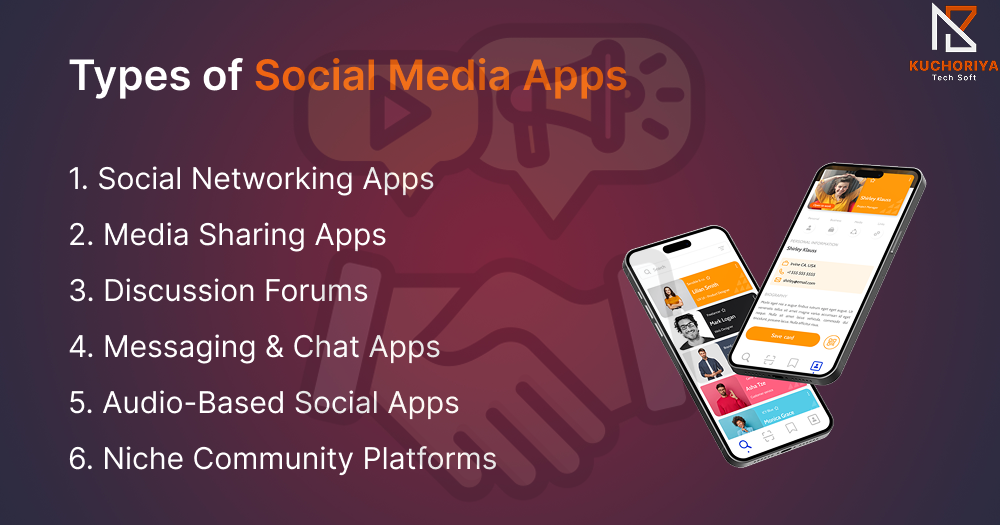
The social media landscape has many categories, each serving a unique purpose. If you want to build a social media app or develop an app like Clubhouse, it’s important to understand the types of platforms before starting your project.
1. Social Networking Apps
Examples: Facebook, LinkedIn. These apps focus on connecting people, building professional and personal networks, and sharing updates. Social networking app development allows businesses to create social network apps that engage users and grow communities effectively.
2. Media Sharing Apps
Examples: Instagram, TikTok, and YouTube. These platforms let users share photos, videos, and creative content at scale. By developing a social media app, you can offer rich media experiences and keep users engaged for longer.
3. Discussion Forums
Examples: Reddit, Quora. These apps enable communities to ask questions, share answers, and participate in discussions on niche topics. Creating a social media platform with discussion features encourages interaction and knowledge sharing.
4. Messaging & Chat Apps
Examples: WhatsApp, Telegram, and Signal. These apps focus on instant messaging, group chats, and media sharing. Using social networking app development strategies, you can build networking apps that provide real-time communication and notifications.
5. Audio-Based Social Apps
Examples: Clubhouse, Twitter Spaces. These platforms rely on voice chat rooms and live audio interactions to engage users. Develop an app like Clubhouse or create an audio social media app with features like public/private rooms, moderation tools, and real-time communication.
6. Niche Community Platforms
Examples: Apps for healthcare, real estate, education, or AI communities. These platforms target specific audiences with specialized features. Custom social media app development ensures that you can create your own social media platform tailored for your industry.
Virtual CTO Insight:
A fractional CTO or remote CTO can guide you in selecting the right type of app, choosing the technology stack, and planning scalability. Whether building a social networking app, media sharing app, or audio-based social app, Virtual CTO services help make your development efficient and future-ready.
The demand for innovative platforms is rising. If you are exploring how to make a social media app or want to know how to build a social media platform with audio-first features, 2025 is the perfect time to act.
1. Growing Popularity of Audio Platforms
Voice-based interaction is trending. By focusing on social media app development, you can create a social media application that captures attention with live discussions and real-time connections.
2. High Engagement and Retention
Users stay longer on apps that feel interactive. If you’re looking at how to create a social media app or make a social networking app, adding audio features helps you build stronger user communities.
3. Flexible Monetization Options
Audio apps offer unique revenue streams like premium rooms, memberships, and sponsored events. A trusted virtual CTO service can help align your social application development with sustainable monetization models.
4. Technology-Driven Innovation
Emerging tools like AI moderation and voice recognition enhance user experience. Whether you want to create a social media platform or develop a social networking site, choosing the right tech stack makes your app future-proof.
5. Opportunity for Niche Communities
From education to hobbies, people seek focused platforms. With custom social media app development, you can freely create your own social media or build premium niche apps tailored to specific industries.
6. Competitive Advantage
Understanding how to design a social networking site and acting now lets you stay ahead of competitors. A fractional CTO can provide strategic guidance while you make a social media app that scales.
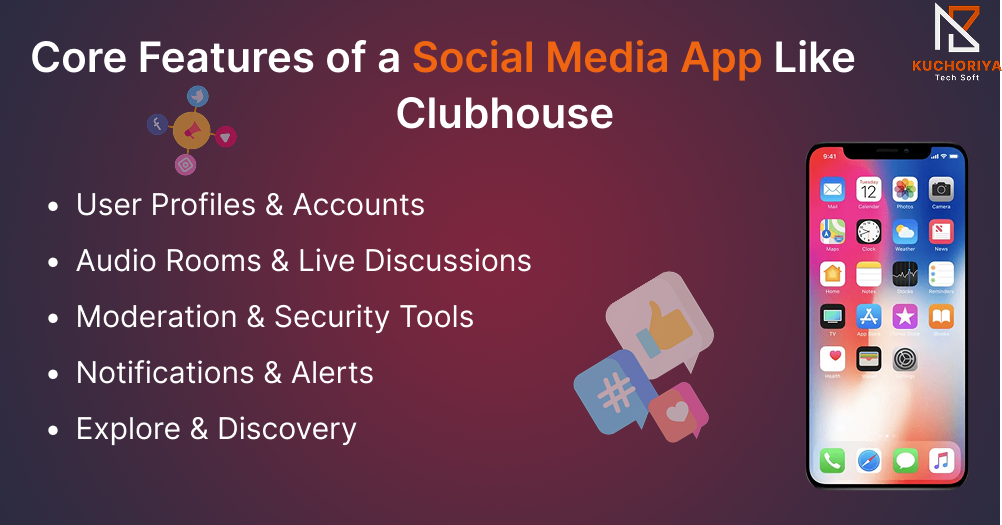
When planning how to make a social media app, it’s important to focus on the core features that create strong engagement. If you’re aiming to create a social media platform similar to Clubhouse, these features are essential.
- User Profiles & Accounts
Every social media application starts with easy sign-up and personalized profiles. This lets users share information, follow others, and connect, forming the base of your social network app.
- Audio Rooms & Live Discussions
The highlight of a Clubhouse-like app is real-time voice rooms. Adding this feature during social application development allows users to join live chats, listen, or host discussions on any topic.
- Moderation & Security Tools
Trust is critical. While you build a social media app, include tools for reporting, blocking, and room moderation. A virtual CTO can guide your team in selecting secure frameworks to keep your platform safe and scalable.
- Notifications & Alerts
Push notifications are vital to keep people engaged. If you’re learning how to make a social media platform, ensure users get alerts when friends join rooms or when new events start.
- Explore & Discovery
A good social media app development strategy includes discovery features. Let users explore trending rooms, communities, and people to follow—helping your social networking app grow naturally.
Choosing the right technologies and roadmap is essential when planning how to create a social media app or even industries like IPTV app development and OTT streaming platforms. A structured social media app development process ensures scalability, speed, and long-term success.
- Front-End Frameworks
For a responsive design, frameworks like React Native and Flutter are widely used. These help make a social media app or even build cross-industry apps, such as healthcare platforms or real estate networking apps.
- Back-End Development
The back-end powers all user interactions and live sessions. When you build a social media app, Node.js or Python provides stability while also supporting industries like OTT app solutions and IPTV streaming.
- Database & Cloud Hosting
A social media application needs secure storage for user profiles, media, and activity. Databases like MongoDB or Firebase allow seamless scaling, whether for social network apps or enterprise-grade platforms.
- APIs & Third-Party Integrations
Integrations bring essential features like payments, notifications, and streaming. In application social network projects, as well as IPTV apps, APIs make the experience smoother and more engaging.
- Testing & Deployment
Before release, testing ensures the app is secure and efficient. With the guidance of fractional CTO services or virtual CTO solutions, businesses can confidently deploy their social application development projects into the market.
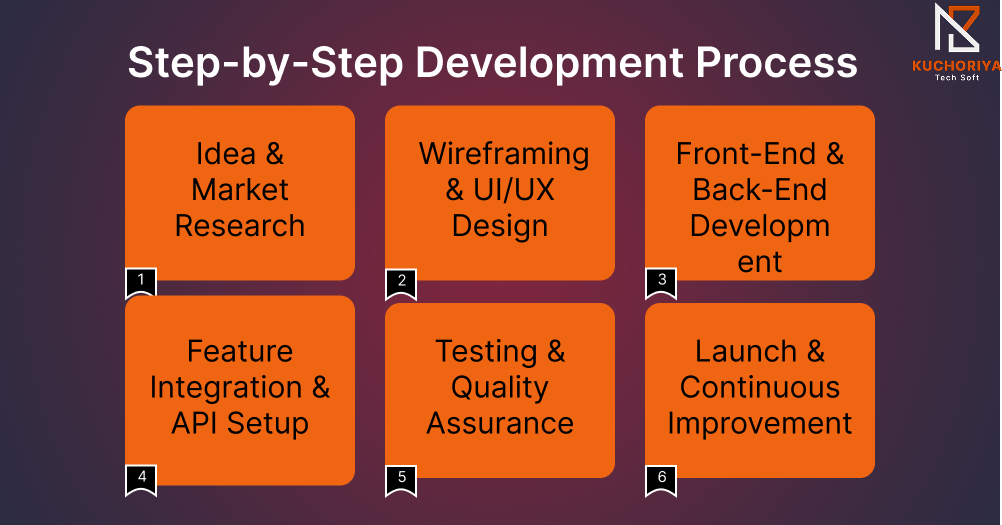
Developing a social media app requires careful planning and execution. If you want to create a social media app, build a social media platform, or make a social networking app, following a structured roadmap ensures success and scalability.
- Idea & Market Research – Before you make a social media app, understand your audience, competitors, and trends. Research helps define the app type, target users, and features for your social media application.
- Wireframing & UI/UX Design – Design intuitive screens and flows. Social media app development focuses on engaging layouts and user-friendly interfaces for your social network app or social application development.
- Front-End & Back-End Development – Choose frameworks like React Native or Flutter for the front-end and Node.js or Python for the back-end. This ensures that your build social media app project is scalable and responsive.
- Feature Integration & API Setup – Add essential features like audio rooms, notifications, messaging, and discovery tools. How to make a social media platform depends on the smooth integration of APIs for payments, streaming, or community interactions.
- Testing & Quality Assurance – Check security, performance, and usability. A robust social media app development company approach ensures that your create a social media app is reliable and ready for users.
- Launch & Continuous Improvement – Deploy your app, monitor engagement, and update features. Knowing how to create a social media app helps in scaling, adding new functionalities, and keeping your social media application competitive.
The investment in a social media app or social network application depends on features, scale, and customization. Whether you’re exploring how to make a social media app, how to build a social media platform, or even launching industry-specific products like IPTV apps or OTT platforms, these are the main cost drivers:
1. Features & Complexity
The cost grows as you add advanced features like live audio rooms, AI moderation, and in-app payments. A basic social media application is affordable, but a full Clubhouse-style social networking app requires a bigger budget.
2. Design & UI/UX
When you create a social media app, custom design, animations, and user-friendly interfaces matter. If you’re learning how to design a social networking site, investing in strong UX ensures your app stands out and engages users.
3. Technology & Infrastructure
The tech stack (React Native, Node.js, cloud hosting) influences costs. Advanced use cases like IPTV app development or OTT platform solutions need stronger infrastructure compared to a standard social network app.
4. Development Team & Expertise
Partnering with a trusted social media app development company or skilled professionals reduces risks. Guidance from virtual CTO services or Remote CTO solutions ensures your social application development follows the right roadmap.
5. Industry-Specific Customization
Apps for healthcare, real estate, or education require custom workflows and integrations. If you want to create your own social media for free, the cost is minimal, but advanced, industry-ready solutions need a higher investment.
6. Maintenance & Updates
After launch, costs include bug fixes, new features, and scaling. Knowing how to develop a social networking site means planning for ongoing support, not just the initial build. A Fractional CTO service can help optimize these long-term expenses.
Estimated Cost Table
|
|
|
|
|
|
|
|
|
|
|
|
|
|
|
Once you create a social media app or even build a social media platform for a niche audience, the next step is turning it into a sustainable business. Here are proven monetization strategies for social media applications in 2025:
1. In-App Subscriptions
Offer premium memberships with exclusive features like private audio rooms, unlimited recordings, or ad-free usage. Many successful social network apps rely on subscriptions for steady revenue.
2. Paid Live Events
Host special audio sessions or conferences where users pay to join. If you want to know how to make a social media platform profitable, paid live events are one of the most effective models.
3. Brand Sponsorships
When you build a social media app, you can attract partnerships from brands that sponsor popular rooms or communities. This model works well across industries, from entertainment to IPTV app development and OTT streaming.
4. Advertising & Promotions
A common model in social media app development is targeted advertising. Ads within feeds, banners, or audio intermissions allow you to monetize while keeping the app free.
5. In-App Purchases
Offer users the ability to buy coins, badges, or virtual gifts. If you’re exploring how to make a social networking app engaging, this gamification model encourages repeat spending.
6. Affiliate Marketing
Integrate product links within conversations or community recommendations. Whether you create a social media platform for education, healthcare, or entertainment, affiliate promotions add an extra income stream.
7. Freemium Model
Start with a free version for mass adoption (e.g., create your own social media for free) and offer advanced features for paying users. A fractional CTO service can help decide which features stay free and which move into premium tiers for maximum conversion.
When you set out to create a social media app or make a social networking app like Clubhouse, it’s important to anticipate the challenges ahead. Every social media application project faces hurdles, but each has a clear solution:
1. Scalability Challenges: As your user base grows, your application's social network may slow down.
Solution: Choose scalable technologies from the start. With Virtual CTO guidance, you can plan architecture that grows smoothly with demand.
2. User Engagement & Retention
It’s not enough to build a social media app—keeping users active is harder.
Solution: add interactive tools like real-time notifications, gamification, and rewards to maintain engagement.
3. Security & Privacy
When you develop a social networking site, user data protection is critical.
Solution: integrate secure logins, encryption, and strong moderation to protect personal information.
4. Monetization Balance
If you’re learning how to make a social media platform, striking a balance between free features and paid services is tricky.
Solution: start with freemium models and expand premium options gradually.
5. Competition & Market Fit
Many companies are trying to create social media platforms or even launch niche apps for healthcare, education, and IPTV.
Solution: Identify a unique value proposition and use Fractional CTO solutions to refine your positioning.
6. Ongoing Maintenance
After launch, constant updates are needed. Whether you make a social media app for entertainment or business, ongoing bug fixes and improvements are unavoidable.
Solution: budget for regular social application development cycles, not just the initial build.
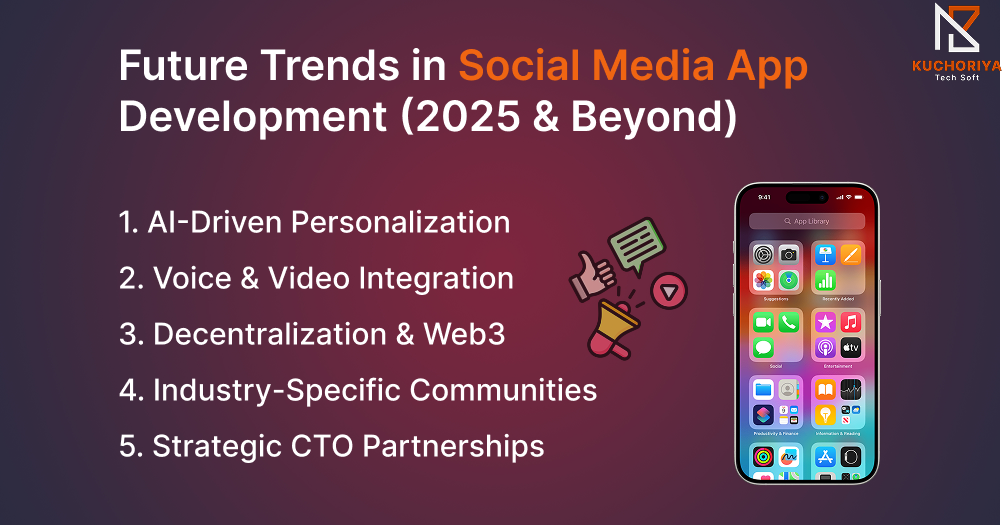
The future of social media app development is evolving quickly. If you are exploring how to make a social media app or how to build a social media platform, these upcoming trends will shape your decisions in 2025 and beyond.
1. AI-Driven Personalization
From content feeds to recommendations, AI will help every social media application feel more unique. Businesses focusing on how to create a social media app should consider AI-powered personalization as a standard feature.
2. Voice & Video Integration
Beyond text, platforms are shifting to real-time audio and video. If you’re planning to make a social networking app, tools like live streaming (popular in OTT platforms and IPTV solutions) will become core features.
3. Decentralization & Web3
New models will focus on user ownership of data and tokens. Entrepreneurs who want to create their own social media platform will look to blockchain and Web3 for more transparent ecosystems.
4. Industry-Specific Communities
Expect to see niche platforms—like healthcare social apps, education apps, and real estate networking platforms. Knowing how to design a social networking site for a specific audience will be a competitive advantage.
5. Strategic CTO Partnerships
As apps become more complex, businesses may rely on virtual CTO advisory or CTO-as-a-service to guide their social application development strategies—ensuring scalability, security, and monetization are future-ready.
At Kuchoriya TechSoft, we are proud to be a top-ranked social media app development company, helping businesses and startups create social media apps, build social networking platforms, and design industry-specific solutions for OTT, IPTV, healthcare, education, and beyond. Our focus is always on scalability, security, and innovation.
Whether you are still exploring how to make a social media app or are ready to launch a full-featured social media application, our expert team will guide you from idea to launch with proven strategies.
Get started today: Contact Us for details, request a quote tailored to your project, or explore our Referral Partner Program to grow with us. At Kuchoriya TechSoft, we don’t just build apps—we help you create future-ready platforms that stand out in the digital world.
Q. What is a social media app?
A. A social media app allows users to connect, share content, and communicate online. Platforms like Facebook, Instagram, and Clubhouse are examples. At Kuchoriya TechSoft, we help businesses build social media apps that are scalable and user-friendly.
Q. How can I make a social media app for my business?
A. To make a social media app, you need a clear plan, the right features, and the best technology stack. Our virtual CTO services provide expert guidance to create robust social media applications efficiently.
Q. What features should a social media application have?
A. Key features include user profiles, messaging, notifications, content sharing, and community moderation. For audio apps like Clubhouse, real-time voice chat is important. Kuchoriya TechSoft ensures your app has all the essential features for high engagement.
Q. How much does it cost to develop a social media app?
A. Development costs vary depending on complexity and features. Simple apps cost less, while apps with real-time audio or video features cost more. Our Fractional CTO and Remote CTO services help optimize your budget while maintaining quality.
Q. Can you develop social media apps for different industries, like IPTV or healthcare?
A. Yes! We create custom social media apps for sectors like IPTV, healthcare, real estate, insurance, and AI, including specialized features for each industry, such as live discussions and community networking.
Q. How long does it take to develop a social media platform?
A. The timeline depends on app complexity. Basic apps may take a few months, while fully featured platforms take 6–9 months. Virtual CTO services help plan and manage the development efficiently.
Q. How do I get started with Kuchoriya TechSoft?
A. You can contact us, request a quote, or join our Referral Partner Program. Our team provides expert guidance to turn your idea into a scalable social networking application.
HIRE A TOP SOFTWARE DEVELOPMENT COMPANY
We are all over the world
United State
9765 keystone court, Clarence, NY 14031 , USA, +1 (650) 488-7911
Canada
1100 Caven St., Suite PH11, Mississauga, ON L5G 4N3 Canada , +1 (416) 726-4662, +1 (650) 488-7911
Brazil
Bispo César da Corso Filho, 1266, San Carlos, São Paulo, Boa Vista, Brazil, 13575-331
South Africa
12 IbisWay, Sunnydale Fish Hoek 7985 Western Cape, South Africa, +27824507091
Spain
The Fir Tree 119 El Olmillo Residential Area Loranca de Tajuña 19141 Guadalajara, Spain
UAE
Building A2 DDP - Dubai Silicon Oasis - Dubai - United Arab Emirates
Italy
Viale dell'Esperanto, 71, Formia, Italy, Lazio IT
Singapore
01-08 50 Ubi Cres, Ubi TechPark, Singapore, 408568
Hong Kong
Tower 2, Silvercord, Rm 907, 9F, 30 Canton Rd, Tsim Sha Tsui, Hong Kong
Australia
Unit 14G, 3 darling point road, darling point, Sydney, NSW, Australia, 2027
India
C-15, 1st floor, Mahalaxmi Marg, Behind World Trade Park, Malviya Nagar, Jaipur, Rajasthan - 302017

